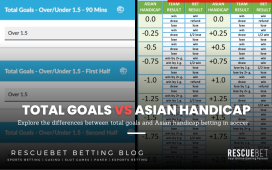Money management is a critical skill that applies to all aspects of life. Managing money extends from managing one’s finances at home to professional portfolio management and everything in between. And while professionals are paid to manage money, anyone in charge of money must know (such as punters) how to manage their money. Even the most successful punters may be brilliant at winning a bet but inadequate at managing their money efficiently. If a punter can’t control their finances, they’re not going to be profitable in the long-run, irrespective of how many bets they win. So in a way, all punters need to be good money managers or adopt some money management systems for their sports betting.
Despite past performances, no one can say what’s going to happen for sure in the future. If we take a stroll down memory lane, we find several instances of a bet going one way and then swinging in another direction, and perhaps, back again. It’s one of the reasons most sports have their fans at the edge of their seats. Take the 2016 season when Leicester won the Premier League. Or even consider the US presidential race in 2020, which was the year’s most significant betting event.
Best Money Management Systems
Here are some of the best bankroll management systems for sports bettors and punters:
Constant Bets Money Management System
A constant bet is one in which a punter places a constant wager for each bet. A continuous bet can also be set as a percentage of the punter’s entire betting bankroll. A punter sets aside a certain amount as their bankroll for all their betting activities. A punter will choose to bet a constant amount that’s from the given bankroll only a fraction of their bankroll. A punter may choose to bet only 2% of his entire bankroll for any wager. It’s advisable that a punter doesn’t set the constant bet too high (6% or above), or an unlucky streak can wipe the punter out.
For example, a punter may set aside $2000 as their betting bankroll. A bankroll amount is the funds a punter intends to use to make a wager and hopefully win. These same funds could also be lost in a wager, and a punter needs to accommodate the risks involved in any wager. So if a punter sets his constant wager at 2%, then the punter will only bet $40 on any given wager at any given time. If a punter sets his constant wager at 4%, then the punter will bet $80 on any given wager. For context, with a 4% constant limit, a punter will need to lose 25 times consecutively to lose their entire bankroll. It’s important to note that a punter’s bet remains the same for each bet (constant) irrespective if their bankroll goes up or down. A consistent betting strategy is a good strategy for novice punters, punters on a limited bankroll, or even punters learning to adopt consistency and a system to their betting strategy.
Compounding Bets Money Management System
A compounding betting strategy is a high-risk and high-reward strategy. As the name implies, a compounding bet is one that compounds the wager placed after a punter wins or loses a bet (depending on their strategy). A compounding betting strategy works the same way as an ongoing betting strategy as in a punter sets his bankroll aside and chooses to wager from that bankroll. A punter even picks how much of their bankroll they’d like to bet with each wager in terms of a percentage.
So let’s say in this example, a punter chooses to bet 5% of his bankroll because he’s feeling lucky. His bankroll amount set aside is $10,000 making each wager $500. So on the first day, he ended up winning, and his bankroll increased to $12,000. On the next day, he sticks to his 5% wager. However, it’s 5% on his new bankroll amount of $12,000. So on each wager for this day, the punter bets $600. Let’s say the punter has a bad run the next day and loses some money. His new bankroll is $8000. So for the next day’s bets the punter makes, he will place no more than $400 on a single bet.
























